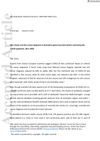 July 2003 in “Journal of Cutaneous Medicine and Surgery”
July 2003 in “Journal of Cutaneous Medicine and Surgery” Skin problems are common in Bangladesh due to arsenic, prompt treatment of diabetic foot ulcers is crucial, maternal transmission causes most neonatal herpes, treatments for pediatric vasculitis are effective, the chickenpox vaccine works, more frequent UVB therapy helps psoriasis, certain jobs increase hand dermatitis risk, monoclonal antibodies treat psoriasis well, lifestyle affects psoriasis, alefacept improves psoriasis, imiquimod cream partially clears basal cell carcinoma, and iron may not help chronic hair loss.
 July 2003 in “Journal of Cutaneous Medicine and Surgery”
July 2003 in “Journal of Cutaneous Medicine and Surgery” Various skin conditions can be treated effectively with different methods, such as discontinuing certain drugs, using specific vaccines, applying creams, and changing lifestyle habits like smoking and drinking.
 July 2003 in “Journal of Cutaneous Medicine and Surgery”
July 2003 in “Journal of Cutaneous Medicine and Surgery” The document concludes that various treatments for skin conditions are effective, but some require further research, and certain factors like gender and lifestyle can influence disease outcomes.
 34 citations,
January 2005 in “Journal of the American Veterinary Medical Association”
34 citations,
January 2005 in “Journal of the American Veterinary Medical Association” Cyclosporine A can reduce inflammation in dogs with sebaceous adenitis, but ongoing treatment is needed.
 3 citations,
January 2007 in “Elsevier eBooks”
3 citations,
January 2007 in “Elsevier eBooks” The document concludes that individualized treatment and lifestyle changes are important for managing menopause symptoms and health risks.
 2 citations,
December 2013 in “Veterinary dermatology”
2 citations,
December 2013 in “Veterinary dermatology” Three dogs with a rare skin condition improved with treatment.
 July 2003 in “Journal of Cutaneous Medicine and Surgery”
July 2003 in “Journal of Cutaneous Medicine and Surgery” Some medications can improve skin conditions, while lifestyle factors like smoking and drinking may worsen them; treatments like monoclonal antibodies and imiquimod cream show promise for certain skin diseases.
 July 2003 in “Journal of Cutaneous Medicine and Surgery”
July 2003 in “Journal of Cutaneous Medicine and Surgery” Treating psoriasis with UVB light three times a week is faster than twice a week, and certain medications and lifestyle factors affect psoriasis treatment outcomes.
 42 citations,
June 2020 in “Seminars in Oncology”
42 citations,
June 2020 in “Seminars in Oncology” Sex hormones may affect COVID-19 severity, with men often faring worse, and targeting related pathways could offer treatment options.
 January 2017 in “Elsevier eBooks”
January 2017 in “Elsevier eBooks” Sex hormones affect reproduction, sexual development, and oral health, and it's important for dental practitioners to understand their effects and interactions.
 31 citations,
September 2012 in “Human Brain Mapping”
31 citations,
September 2012 in “Human Brain Mapping” People with Seasonal Affective Disorder have different brain activity in certain areas when resting.
 141 citations,
March 2011 in “Journal of Dermatology”
141 citations,
March 2011 in “Journal of Dermatology” Eczema and fungal infections are the most common skin problems in Japan, with different age groups and genders affected by various conditions.
September 2020 in “Research Square (Research Square)” Goat skin adapts to seasonal changes through genes that respond to daylight length, affecting hormone levels and potentially making skin cells light-sensitive.
 109 citations,
January 2011 in “Frontiers in Systems Neuroscience”
109 citations,
January 2011 in “Frontiers in Systems Neuroscience” Choosing the right model order in brain connectivity analysis can affect the detection of differences between healthy individuals and those with seasonal affective disorder.
 1 citations,
October 2013 in “Revue d'Épidémiologie et de Santé Publique”
1 citations,
October 2013 in “Revue d'Épidémiologie et de Santé Publique” Higher unemployment rates are linked to increased suicide rates, especially in men aged 25-49 in France.
 May 2022 in “Pakistan Journal of Medical and Health Sciences”
May 2022 in “Pakistan Journal of Medical and Health Sciences” Young women were the most common patients at the dermatology clinic.
 April 2019 in “Journal of Investigative Dermatology”
April 2019 in “Journal of Investigative Dermatology” Allergens show specific patterns related to season, gender, and age, which can help in developing allergy avoidance plans.
Preventive measures and education can reduce common skin disorders in children.
 3 citations,
May 2021 in “British Journal of Dermatology”
3 citations,
May 2021 in “British Journal of Dermatology” The COVID-19 pandemic led to fewer skin checks and skin cancer diagnoses in Australia in 2020.

COVID-19 can cause skin problems and affect dermatology treatments, with recommendations for skin care and cautious use of certain drugs.

Different drugs are used to manage breeding, prevent or end pregnancy, and treat reproductive issues in dogs and cats.
 November 2015 in “International journal of science and research”
November 2015 in “International journal of science and research” Adult acne is mostly inflammatory, affects women more, and often scars, needing good treatment to prevent damage.
 149 citations,
June 2002 in “Veterinary record/The veterinary record”
149 citations,
June 2002 in “Veterinary record/The veterinary record” Trilostane effectively improved symptoms in dogs with a certain adrenal gland disorder.
 143 citations,
September 1991 in “Archives of Dermatology”
143 citations,
September 1991 in “Archives of Dermatology” Generalized pustular psoriasis patients often need strong medication and careful treatment due to flare-ups and complications.
 125 citations,
August 2020 in “Frontiers in Immunology”
125 citations,
August 2020 in “Frontiers in Immunology” Men generally have more severe COVID-19 cases and higher death rates than women due to biological differences.
 118 citations,
October 2013 in “Trends in Genetics”
118 citations,
October 2013 in “Trends in Genetics” The AUTS2 gene is linked to neurological disorders and may affect human brain development and cognition.
 73 citations,
March 2014 in “Journal of The American Academy of Dermatology”
73 citations,
March 2014 in “Journal of The American Academy of Dermatology” Most dermatologic medications are safe during pregnancy and breastfeeding, but some should be avoided due to potential risks.
 58 citations,
June 2000 in “The Journal of Steroid Biochemistry and Molecular Biology”
58 citations,
June 2000 in “The Journal of Steroid Biochemistry and Molecular Biology” Different types of androgens bind differently to two receptors, AR1 and AR2, in Atlantic croaker's brain and ovarian tissues, suggesting these receptors may control different androgen actions in fish.
 48 citations,
November 1992 in “Clinical Endocrinology”
48 citations,
November 1992 in “Clinical Endocrinology” Long-term finasteride use doesn't change bone density or metabolism.
 46 citations,
November 2011 in “Forest Ecology and Management”
46 citations,
November 2011 in “Forest Ecology and Management” Understanding the fruiting patterns of Ficus trees can improve forest restoration by ensuring pollinators survive and biodiversity is supported.



























